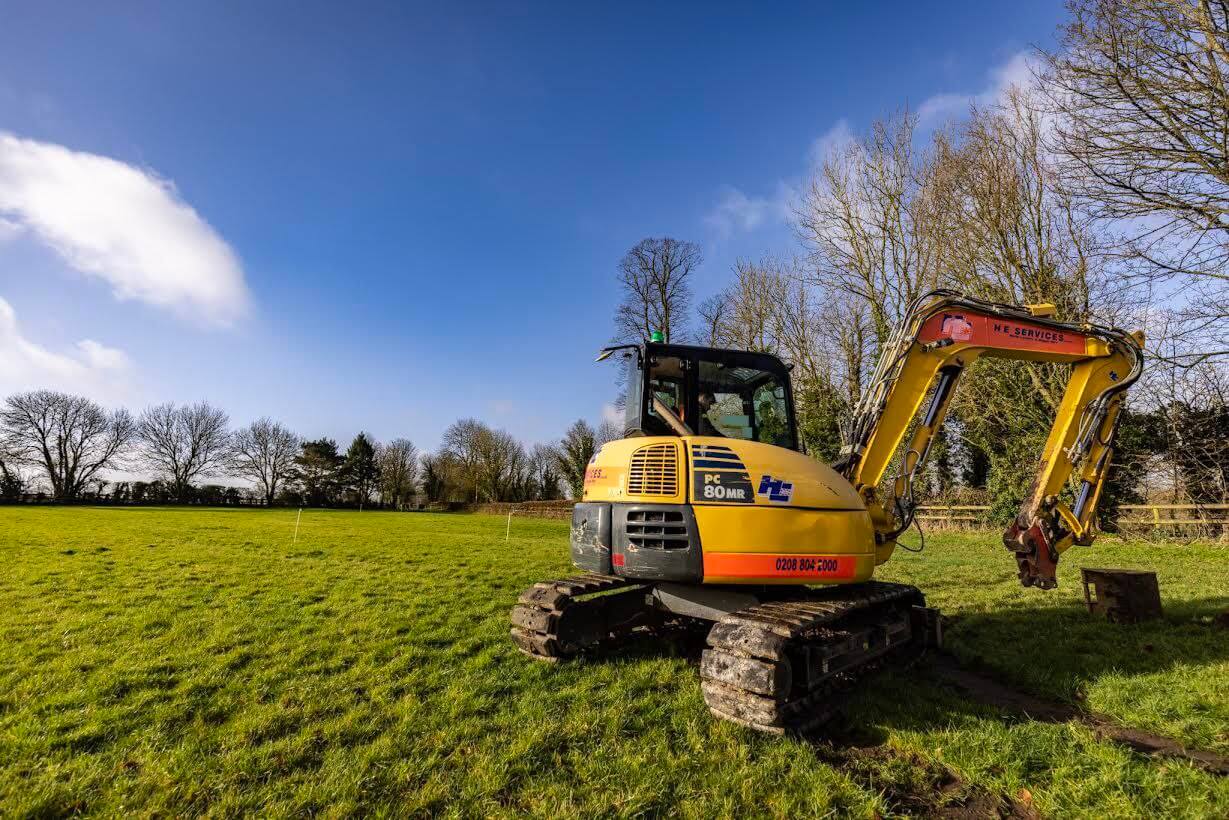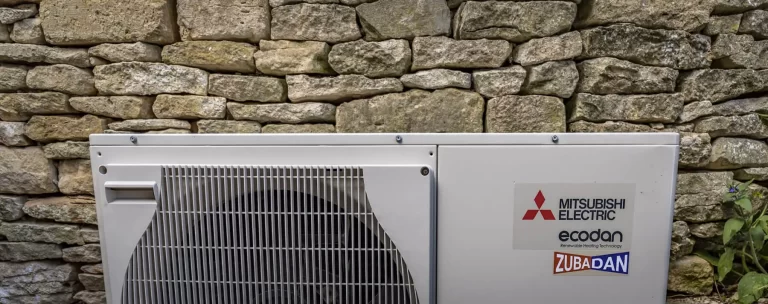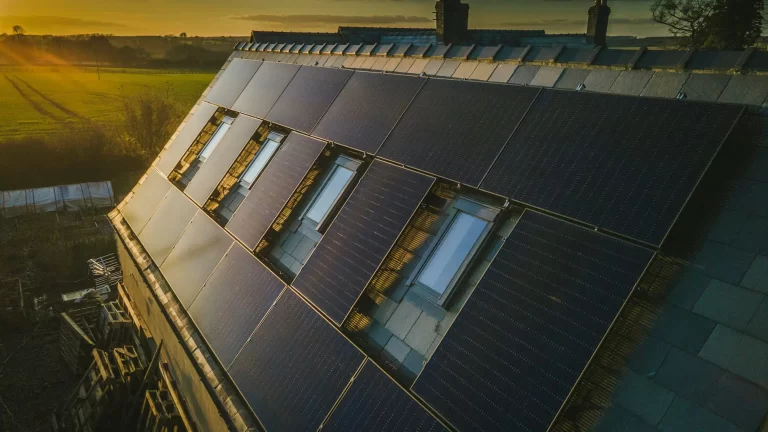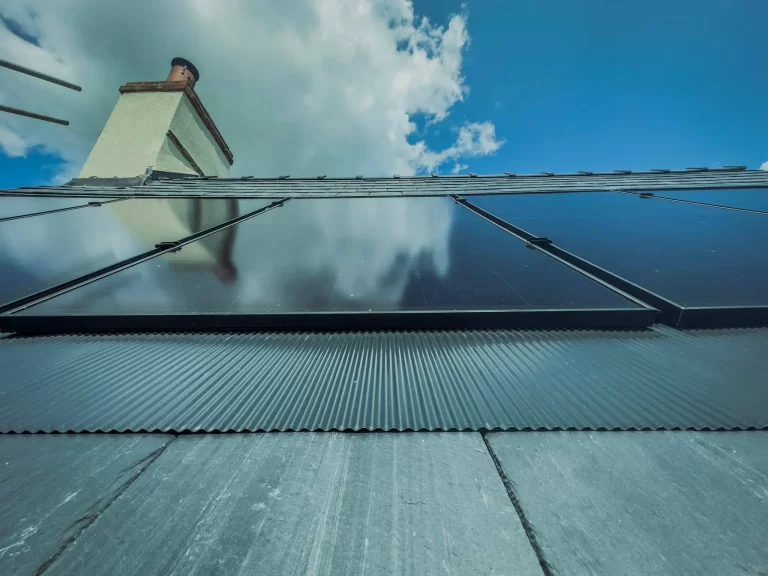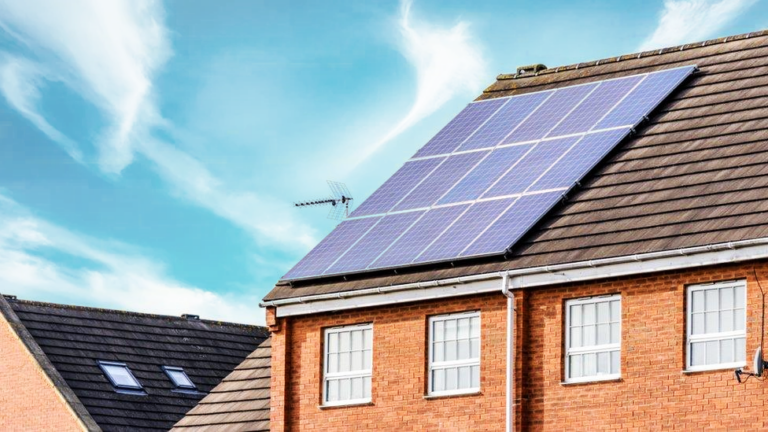Ground source heat pumps (GSHP) are heating systems that take heat from the ground outside and use it to warm your home and its water through either radiators or underfloor heating. Also called ground-to-water heat pumps, these systems have risen in popularity due to their environmentally friendly benefits, as they’re a more renewable and energy-efficient solution to heating homes and business premises than traditional boilers.
In this guide, you’ll discover everything you need to know about how ground source heat pumps work, the benefits they can provide, and whether installing one is right for your needs.
How Does a Ground Source Heat Pump Work?
Ground source heat pumps work by transferring heat from the ground into buildings to keep them warm. This is achieved through a network of pipes in the ground that are filled with cold liquid (usually a mixture of anti-freeze and water), which absorbs heat from the ground and transfers it to the heat pump. Here, the heat is condensed and compressed, increasing its temperature so that it can be used to effectively heat a building. The liquid in the pipes continues to circulate after the heat has been transferred to the pump, restarting the cycle and ensuring a continuous flow of energy.
How Much Does a Ground Source Heat Pump Cost?
What are the Benefits of installing a Ground Source Heat Pump?
A ground source heat pump can be a great alternative to traditional boilers in both homes and business premises. Here are some of the benefits you can expect to see after installation:
Energy Efficient
Ground source heat pumps are incredibly efficient in the way they produce energy. For every 1kW of electricity a heat pump consumes, you can expect it to produce 4-5kWh of heat, giving it a 400-500% efficiency rate.
Renewable Energy
While a GSHP does need electricity to run the condense and compression cycle, it uses a completely renewable source of energy to heat your home. The heat found in the ground is a result of solar energy and occurs naturally all over the world, making heat pumps a much greener alternative to generating heat solely by burning fossil fuels. For a completely renewable system, you can even power your heat pump with energy from solar panels or a wind turbine, or look at using a green electricity tariff.
Lower Carbon Footprint
Ground source heat pumps contribute to cleaner air with their associated lower carbon emissions. Air pollution is a growing problem, and heat pumps only use a small amount of electricity to operate while producing no carbon emissions themselves.
Affordable
As a result of their impressive energy efficiency, GSHP users typically enjoy a reduction in both their carbon footprint and their energy bills. What’s more, heat pumps are less likely to be affected by changes in fuel prices, as the heat energy they rely on is completely free.
Low Maintenance and Safe
Heat pumps require very little maintenance to remain in good working order, which means a lower risk of needing to pay for costly repairs and no need to order fuel. Ground source heat pumps also pose very little risk to those relying on them for energy. As there’s no combustion needed for them to produce heat, you needn’t worry about fires or explosions.
Indoor Installation
While ground source heat pumps need to use the energy in the ground outside of your home to generate heat, the pump itself is installed inside for easy access. They take up slightly more space than a standard boiler and are a similar size to a tall fridge/freezer, making it possible to hide one in a hallway cupboard.
Smart Home Capabilities
Heat pumps are fully compatible with any smart temperature controls you have in your home, meaning you can create a schedule for your heat to come on and make full use of your thermostat.
Compatible with Most Properties
A lot of people assume that heat pumps can only be installed in new-build homes, but that’s not the case. Ground source heat pumps are suitable for all kinds of homes and buildings, meaning that even people living in listed houses, urban flats, or rural cottages can benefit.
Cooling Function
Ground source heat pumps are most often used for their heating capabilities, but they can also cool your home in the summer months with the liquid in their pipes.
Potential Downsides of a Ground Source Heat Pump
It’s without a doubt that ground source heat pumps come with many more pro’s than they do con’s, but that doesn’t mean that they’re completely free of disadvantages. The biggest cause for concern amongst first-time heat pump users is the initial installation costs, which can be significant. However, there is funding available to offset some of these costs, helping more people to make their homes greener and enjoy energy savings further down the line.
Another potential downside is that it can be more difficult to install a heat pump if you have a very small garden. However, don’t rule your home out completely before exploring all the heat pump options out there, as some don’t take up as much space as others i.e. Air Source Heat Pumps
What are the Different Types of Ground Source Heat Pumps?
The type of ground source heat pump you need will depend on the space you have available, the size of your home and how much energy you need. Heat pumps are commonly split into two main categories: vertical and horizontal ground source heat pumps.
Horizontal installations are usually cheaper than vertical, but are best suited for people who have more space available as the trenches that need to be dug often span larger distances. A vertical ground source heat pump, on the other hand, are more accessible to those living in built-up areas, but will cost more due to the boreholes that need to be drilled deep into the ground.
Ground Source Heat Pumps vs Gas Boilers: How Do they Compare?
While a ground source heat pump will be more expensive to buy and install than a gas boiler, they can help you to save money in the long run. This is because of how efficient they are, with many boasting efficiency rates between 300-500%. When compared with a gas boiler’s average efficiency of 90%, it’s easy to see what a big difference switching your heating system can make.
It may also seem like heat pumps could be expensive to run due to their consumption of electricity, which is currently more expensive than gas. However, due to their high-efficiency rates, ground source heat pumps are cheaper to run overall.
Where a ground source heat pump will shine even more is when it’s powered by your own solar energy, as this can keep costs minimal depending on the amount of energy you generate.
Air Source Heat Pumps vs Ground Source Heat Pumps: Which is Better?
How to Maintain a Ground Source Heat Pump
A GSHP will require very little maintenance aside from occasional servicing. Because the heat pump itself will be inside your home, you don’t need to worry about it being damaged by the weather and the pipes installed underground will be similarly unaffected.
However, if you want to make sure your GSHP is always operating at its best, there are a few checks you can perform.
Your GSHP should come with documents that help you to understand when the system is operating at peak efficiency. Check the thermostat and control equipment to make sure they’re within the required range and functioning as they should. Even if your home is being heated normally, if something is not quite right with your heat pump it could be using up to 25% more energy than it should.
Ferequently asked questions
Will a GSHP work in the Winter?
How Hard is it to Install a Ground Source Heat Pump?
The installation of a GSHP requires specialist bespoke heating engineers and designs due to the amount of digging, electrical and plumbing work that needs to be done, plus many other considerations associated with an installation.
Fitting the pipes in the ground outside does require more work than installing the heat pump, but this should be undertaken by professionals. As this part of the project will happen outside your home, you can mostly continue on as normal without disturbances to your daily routine.
Is Planning Permission Necessary for Heat Pump Installation?
You’re unlikely to need planning permission to install a heat pump, as they’re considered to be permitted developments. They’re also unlikely to cause problems for neighbours, as the pipes will all be underground and the pump itself inside your home. However, if you’re having multiple heat pumps fitted or you’re installing pipes over a large area of land, you may need to ask for planning permission. Always check the rules in your local area before starting work.
What Grants are Available for Ground Source Heat Pumps?
The most common grant available for installing a GSHP is the Boiler Upgrade Scheme (BUS), an initiative that’s encouraging homeowners to trade their traditional, fossil-fuel-burning boilers for greener heat pumps. Under the scheme, you may be eligible to receive £7,500 that can be used towards the installation of a GSHP which, depending on the heat pump you require, may cover around half the total costs.
Is it Worth Installing a Ground Source Heat Pump?
Yes, ground source heat pumps are well worth the investment. Whether your motivations are to contribute more positively to the environment or to lower your energy bills, a ground source heat pump delivers on all fronts. Despite their initial cost, you can more than make up for the money you spend over your heat pump’s lifetime, especially if you capitalise on available grants.
GSHP’s can be a great way to save money and pave the way to a greener future. Thanks to grants, they’re becoming much more accessible to a wider range of households and businesses while posing little risk to those that have them installed. Find out whether GSHP’s could be suitable for your situation today.
Is My Property Suitable for a GSHP?
Not every property is well-suited to having a ground source heat pump installed and one of the main points of consideration is how much outdoor space you have available. Because you will need to have a network of pipes installed underground, you will need to have a garden or plot of land that’s at least twice as big as the space your home takes up. This area should be free of any structures like garages and sheds, as it will all need to be dug up.
Ground source heat pumps are also better suited to properties that are well insulated, as poor insulation can impact the efficiency of your heat pump. However, that doesn’t mean older buildings that lack insulation can’t use heat pumps as they can still be very compatible with this heating system.
What’s the Average Room Temperature for a GSHP?
GSHP’s can help you to maintain a constant temperature inside your home, especially when linked to a thermostat. Most homeowners have their heat pump thermostats set between 18-21 degrees (British heating standards), but most heat pumps can maintain higher temperatures as well if required. Whatever temperature you choose, it’s often recommended that your heat pump remains on constantly, as warming up your pump from cold not only uses more electricity, but can also take longer than a conventional boiler.
How Fast Does The Water Heat Up?
The speed that your pump heats water will depend on whether it’s already warmed up and the power of the pump itself. You can expect the average heat pump to take up to four hours to heat your home’s water from cold. Larger, more powerful heat pumps can heat water more quickly, but this may not be necessary if your household is relatively small. If you know you’re going to need hot water throughout the day, you can leave your heat pump on for instant access.
Can You Have Multiple Showers Without Running Out of Water?
Yes, a ground source heat pump will be able to heat enough hot water for multiple showers. However, this will depend on the size of your heat pump, how long it’s been turned on for and the number and lengths of the showers being taken. This is why it’s so important to get a pump that’s the right size for your home. As long as you factor in the number of people taking showers and any other hot water needs you have, your pump will always be able to deliver exactly what you need.
Is a GSHP Suitable for Heating Water?
Heat pumps are suitable for heating both your home as well as your water. The temperature your water is heated to will depend on the type of heat pump you choose, but you can expect a temperature range of 45-55°C. However, most homes limit the water temperature to around 38°C for baths and showers, which means your water temperature should remain at a comfortable level.
Will a GSHP Be Compatible with My Radiators?
In most circumstances, your heat pump should work with your existing radiators, but it may be advisable to upgrade around half of them to a larger size in order to maximise efficiency. Heat pumps need to be linked to a wet system in order to heat your home via radiators, but fortunately, this is the most common heating system in UK homes. A wet system simply refers to water being circulated through radiators or under the floor to keep your home war
Is a GSHP Noisy?
No, a ground source heat pump won’t make very much noise. Despite being installed inside your home, you’re very unlikely to be disturbed by your heat pump, which won’t be much louder than a dishwasher. Air pumps, on the other hand, are a little bit noisier but not to the extent where they’re likely to cause any disturbances to either you or your neighbours.

